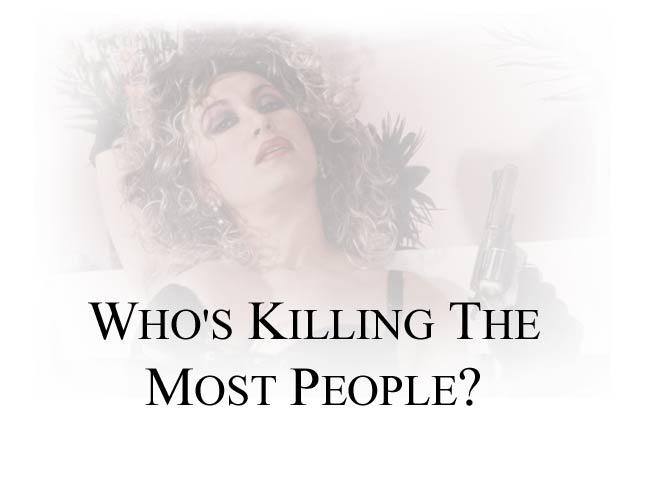 |
 |
 |
| |
|
|
|
|
|

Twenty five million people are DEAD because of policies against women in Africa.
Many more millions are infected with AIDS and EBOLA - the two DEADLIEST PLAGUES ON THE PLANET.
This happens because AFRICAN WOMEN AND CHILDREN CAN'T SAY NO TO MEN.
Men RAPE VIRGINS thinking it cures them of aids.
And AFRICAN PARENTS, once programmed into Patriarchal attitudes, assist in the demise of their children BY LETTING MEN WITH AIDS HAVE SEX WITH THEM.
It's all part of the status quo of Patriarchy around the world. And you thought we had it bad here? |
FEMALE
EMPOWERMENT
& ADOLESCENT
DEMOGRAPHIC BEHAVIOUR
Anastasia
Gage
(Sierra Leone), Pennsylvania State University
Stockholm the 25th of April 1997
--------------------------------------------------------------------------------
This is a documentation from an international seminar on women's empowerment held in Stockholm. The seminar was organised by RFSU (Swedish Association for Sexual Education) in co-operation with the Department of Demography at Stockholm University. The seminar was enabled through financial support from Folkhälsoinstitutet, the Foreign ministry, Sarec and Botilda. The seminar is following after a scientific seminar on female empowerment in Lund on how to follow up the Cairo and Bejing conferences.
--------------------------------------------------------------------------------

Photo © Rasa Von Werder
FEMALE
EMPOWERMENT & ADOLESCENT
DEMOGRAPHIC BEHAVIOUR
The
focus of this presentation is on the sexual behaviour and contraceptive use
in Sub Saharan Africa. The presentation deals with power dynamics and how adolescents
experience power. This needs to be explored in order to know how to deal with
the situation in which many adolescents are today. How power relations affects
the sexual life will be discussed as well as the contraceptive behaviour and
reproductive choices of adolescents.
The need
to empower adolescents has not been acknowledged. The knowledge about adolescents
is limited. In the western world there is a tendency to see adolescents relations
in a romantic light and therefore deny the power struggles in these relationships.
Recent studies have shown that adolescents are experiencing violent dating relationships
and sexual coercion. This has put female empowerment among adolescents in the
fore front.
In the developing countries there has been a high raise of aids, and the rate of unintended pregnancies is high. Many AIDS intervention strategies have recently begun to question those interventions who rely on that women can control the sexual encounter. It has been realised that women alone can not reinforce condom use without having active participation of men. The great age gap in marriages, which is common in developing countries, leads to a powerlessness for the adolescents. In the situation of declining economies money transactions has become a more common feature in adolescents relationships.
HOW
FEMALE ADOLESCENTS
EXPERIANCE POWER :
ACCESS
TO RESOURCES
In
Sub Saharan African more attention has only just begun to be paid to the economic
bases of power. Adolescents are particularly vulnerable to this. It is socially
accepted for old men to have sexual relations with young girls. "Sugar
daddies" who act like sponsors to young school girls are common. The school
girls often lack resources to go to school and they therefore enter such relations
to be able to get an education. Families prefer to spend money on educating
boys. Sex becomes a way for girls to get an education, especially on higher
levels of education.
There is
a serious problem of male teachers demanding sex in return for good grades.
This problem is not addressed as it is seen as OK for old men to have sexual
relations with young girls.
The obstacles
can appear at all stages in line. At the labour market it is not unusual with
bosses expecting sex as condition for employment and promotion. The system of
paying with sex can thus permeate the world of the adolescents.
In Sub Saharan Africa there is a phenomena of bride wealth linked to education. In the region bride wealth is the exchange for marriage. Parents are now facing limited resources why they get prospective suitors to pay for the school fees for the girls. When the prospective suitors, who is supposed to be like their fiancées, pay the school fees they use that as bride wealth, and the men want to see some in return for their money. So the family push their girls into sexual relations with these men even while they are in school. If a pregnancy occurs they just take them from school and send them to live with their husband. This bride wealth is so tied up with female education, particularly among poorer families, so if girls want to get secondary education they often have very restricted choice.
 |
 |
Photo © Rasa Von Werder
HOW
FEMALE ADOLESCENTS
EXPERIANCE POWER :
CULTURALLY DEFINED SOCIAL
RELATIONS
When talking about how adolescents experience
power it is important to also look beyond access to resources and look at culturally
defined social relations. Parental power is legitimised in many contexts. Parental
power can for instance mean that parents arrange marriages, denies adolescents
contraception, decides whether an unmarried pregnant woman should have an abortion
or not, or prevents the adolescents to seek the health care that they need.
It is important not to ignore parental power which is legitimised to a large
extent.
In many countries there are multiple systems of justice. There is a legal minimum
age of marriage, but it only applies to the 25 percent who are thought to be
governed by statutory law. For those who are governed by customary law the parents
can arrange marriage at any time, there is no minimum age. Even an unborn child
can be conditionally married to a man, if it proves to be a girl the she can
when still being a child move to be raised in the husbands household.
STRUCTURAL
CONDITIONS
Women
do usually not have access to resources, such as land and cattle, unless being
married. Therefore marriage is very important to the women. It is also important
that the wife gets children to solidify their positions and try to make sure
to get access to resources through children as there is no spousal inheritance
from each other.
If women are not educated and the government does not have positive discrimination in terms of children's education, insisting that parents send their daughters to school, and penalising parents that do not send their daughters to school, female adolescents inaccessibility to resources will continue. Those girls value marriage and childbearing as a way to access resources, because those are their options. If they do not go to school they have no other options than to marry and have children.
GENDER IDEOLOGY
The socialisation and gender ideology is crucial for the
power relations. Even if you have resources you may not use those resources
to exercise power. Most cultures have defined what it means to be masculine
and feminine. To be feminine often means to be non aggressive, non assertive,
to listen to the husband and parents, whereas masculinity means to be assertive.
A number
of studies show that male adolescent subscribe to masculine ideology which means
that they should be assertive and not listen to what the women say, as they
have been raised like that. These male adolescents are the ones who will have
more sexual partners in a relationship, they will have less consistent condom
use, they have less belief that males have responsibility to prevent pregnancy,
and they believe that if the women gets pregnant that defines and validates
their masculinity.
The gender
role socialisation means for the females that they should be submissive to the
males, the females shall be subordinate in a sexual relation. That impacts of
course on whether they can say no to unwanted sex, use contraception, or even
just talk to their partners about how to protect themselves from HIV and sexually
transmitted diseases.
Another
important issue is sexual aggression and sexual coercion. It is common that
females are coerced into sexual relationships. This coercion comes from all
sorts of people, like male adolescents, from older men outside the family, from
the large extended family. No body is worried about having sex with a minor,
as the legal and social discourse does not prohibit it.
In Sub Saharan Africa some men with HIV think that a they can get rid of the disease by having sex with a virgin. This has led to a rise in the proportion of women who are raped and sexually abused by older men. This has to do with the way masculinity is seen and the way males are seen to have access to women. Because of their hardships families are also encouraging their daughters to have such relations with men who are twenty years older, whom have been so much exposed that the daughters are in a great danger to catch the disease, though this never occurs to the parents.
HOW TO EMPOWER ADOLESCENTS
To
empower adolescents it is important to let them know how power operates in their
lives. They also have to recognise how they as individuals and how the communities
are affected by the way power operates. Many people do not recognise that they
are powerless, because you tend to think that "this is the way society
works, and has done for generations". The adolescents also develop skills
of how to change the power balances in society. Most important is to make them
psychologically believe that they can control their own lives. The female adolescents
of Sub Saharan Africa are commonly considered as not capable of taking decisions,
which makes them think that nothing is within their control. Even in the sexual
encounters they do not have that control and think that they can make a decision.
When deciding how to approach this it is important to consider that the situation
of the different countries vary enormously.

Photo © Rasa Von Werder
Peer counselling
is an important way of spreading the empowerment. Empowerment at group level
can be very efficient. When an adolescent gains power over her own life and
has understood that all the adolescents are subjected to certain conditions
she can help others in getting power over their lives. It is also important
to understand the female socialisation process and the gender role stereotyping.
From a demographic point of view it is important to get the adolescents able to exercise their reproductive choices. This can mean to chose not to engage in sexual activity, not to engage in sexual activity without informed consent, to get males to conform to safe sexual practices, to ensure not being at risk for unintended pregnancy or a sexually transmitted disease, ability to negotiate pleasurable sex.
NEED
FOR EXAMINATION
OF
NON-MARITAL RELATIONSHIPS
It
is important not to only focus on the married adolescents but also on the unmarried
who have a more vulnerable economic situation and who also have a greater risk
of getting sexually exploited. Power can be very entrenched. A researcher from
Ghana has said that it is inconceivable for an unmarried woman to refuse sex
unless she is menstruating or she is really sick, because sex is the men's undeniable
right.
In the so called "courtship game" many men approaches girls for sexual relations outside the protection of the family, and the adolescents have to learn how to negotiate and deal with many different men. The adolescents tend to have a distorted assessment of their ways, thinking that they are not in risk of pregnancies, which also affects their way of assessing the risks of pregnancy.
THE IMPORTANCE ADDRESSING THE EMPOWERMENT OF ADOLESCENTS
SOME
IMPORTANT STEPS TO
TAKE
If
girls are to be empowered their access to resources such as basic education
has to increase. However, in schools the gender stereotypes are still strong
and gender socialisation is enforced in schools.
If girls
are given access to resources independent of the family, their capacity to achieve
a favourable balance of power in relationships can be enhanced. Their independence
from the families, who often have very strong influence on adolescent girls,
can be increased. Wider social networks could be developed and create less dependence
of men and children. Without access to resources the women have to depend of
men and children for survival and also for status.
Access to information and services can foster feelings of empowerment and has to be increased. Many adolescents have a poor knowledge about safe sex, and distorted ideas and faulty knowledge of how likely they are to get pregnant. Information would empower them to know how to protect them selves towards unwanted pregnancies.
In the
past it was the task of the family to bring the information about sex and pregnancies
to the adolescents, this was performed not by the parents but by the grandmothers
and aunts. These networks have now broken down, first of all because of migration
but also because of education. The parents that traditionally not was expected
to talk to their daughters about pregnancies do not know how to do it. The schools
do not want to take the responsibility to give information about sex to the
adolescents. Thus there is now a gap to be filled, right now there is nobody
who provides the adolescents with adequate information.
It is important to give adolescents confidence and a sense that they can control reproductive behaviour and their sexual activity.

Photo © Rasa Von Werder
COSTS & BENEFITS
OF CONTRACEPTION
Almost
all girls know that there are costs to become pregnant. They can not continue
their education as pregnant girls or mother's are not allowed in schools, and
the parents will kick them out of the house. Still they will not use contraception,
because they see contraceptive use as involving a cost. The first cost is the
negative attitude they will find from family planning providers to young unmarried
girls who are sexually active. Family planning providers are often willing to
give contraceptives to young girls provided that they are married. They see
the premarital sexually active girls as transgressing all the rules of the society,
why they often refuse to give contraceptives to them.
There is also a fear of negative side effects of the use of contraceptives, the fear that especially the pill will lead to infertility. Childlessness is not a culturally accepted option for women. Therefore the girls do not want to use the pill or the IUD even if they had access to do that.
Another
cost is associated with going to the same clinic as everybody else in the community.
There is no privacy and people are afraid of gossip.
Not all
adolescents want to avoid pregnancy. Some want to become pregnant, especially
in West Africa where pregnancy can be a prerequisite for marriage. The men are
scared of marrying a woman that is not going to be pregnant. It is important
to have a child within the two first years of marriage to solidify the woman's
marriage position. If the woman does not have a child she will be subject for
labelling and the man can threat to get another wife. Infertility is considered
the women's fault.
It is important to try to increase the girls abilities to make decisions on partner choice, as those who chose their own partner are more likely than those in arranged marriages to discuss childbearing issues with their partner and also to use contraceptives.
PUTTING
KNOWLEDGE
INTO PRACTICE
It
is not enough for the adolescents to have the knowledge and ability to use contraceptives,
they also have to put it into practice, which can be very hard. Condom use for
example have many negative connotations, many girls refuse to have condoms as
they will be considered prostitutes. This is the most challenging, how can you
make a person that is given the knowledge, given everything to put that into
practice. Role-playing and peer counselling can be of use, getting the adolescents
together as a group, showing them how others are exercising power over them
and trying to get them ways of avoiding or manipulating the power. Together
they can develop strategies of trying to enforce change, changing their partners
and becoming more aware of power and how it is played out in their lives.
ADOLESCENTS
-
A SENSITIVE ISSUE
Adolescents
is a very sensitive political issue in many African countries. Many communities
and societies still refuse to talk about adolescents, still condone early marriages
and relations between young girls and old men and are still against premarital
sexual activity. There are enormous barriers even just to give information to
adolescents about biology. There are enormous political obstacles to empower
adolescents. One way to go is to make communities realise that if they deny
the adolescents information in this world of AIDS they will sentence the future
of the community to death.

Photo © Rasa Von Werder
| HOME
| UPDATES
| GALLERIES
| FOUNDER
| SHOP
| INTERACT
| JOIN
US! © 2004 - 2006 RASA VON WERDER
|